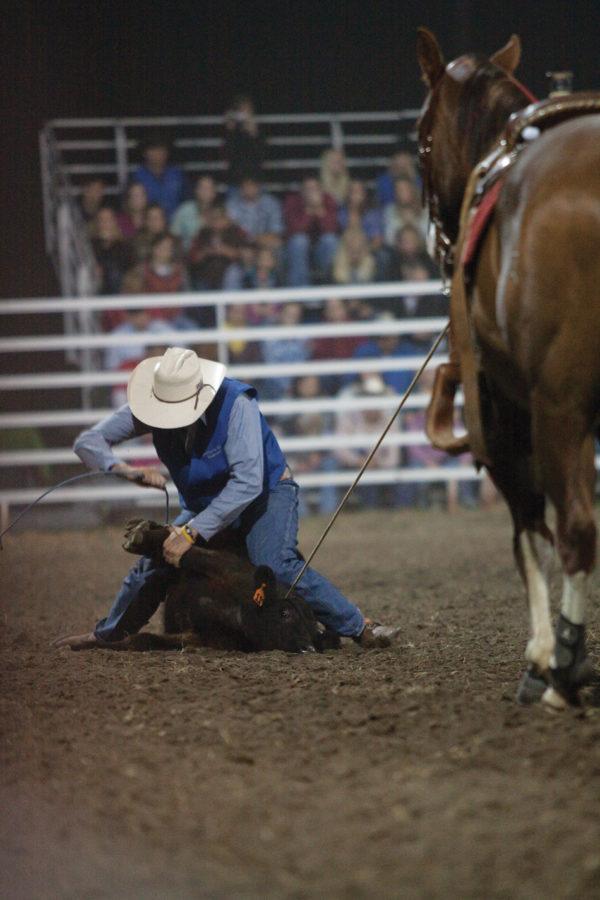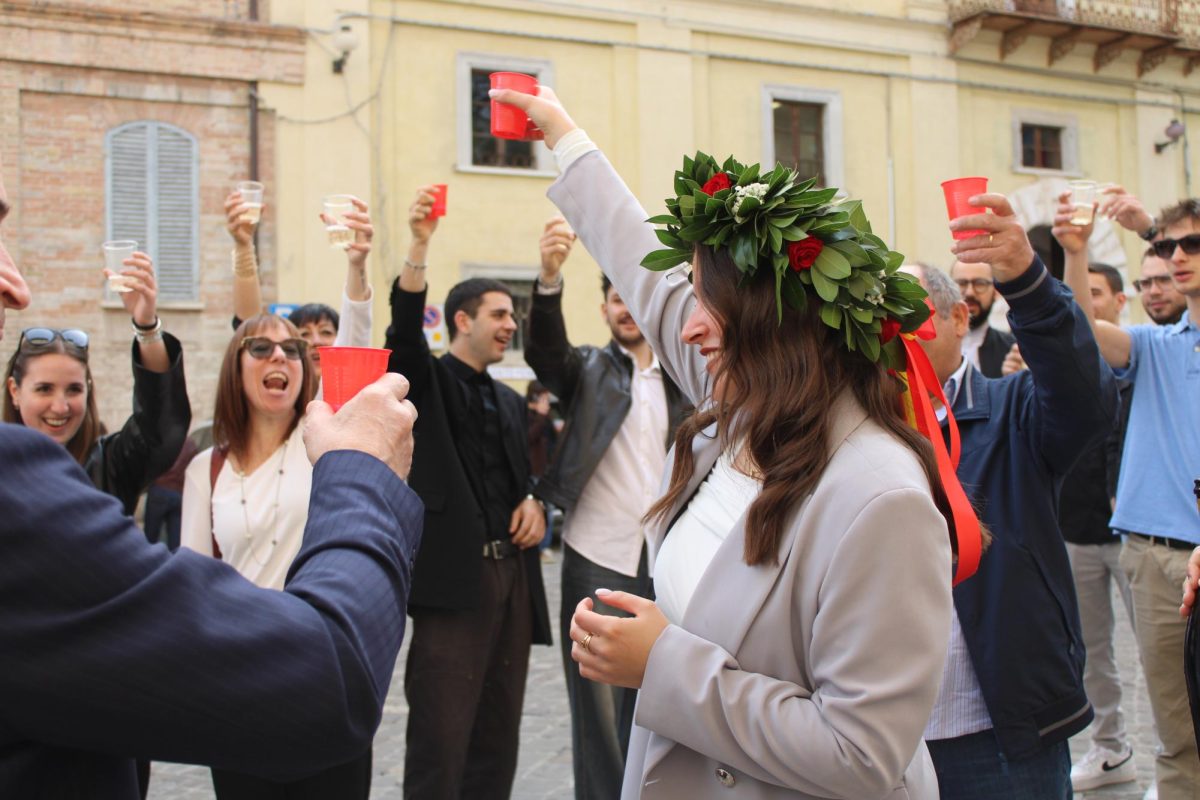Tisinger: Rodeo Club rocks, so does country
Photo: Kelsey Kremer/Iowa State Daily
Matt Wznick, from Dickinson State University in North Dakota, ties down a calf in the tie-down roping competition during the Cyclone Stampede Rodeo on Friday, Oct. 1, 2010, at the Iowa State Rodeo Arena.
April 13, 2011
This weekend is going to be an exciting, if long and sleepless one. Like most students, I am amped for VEISHEA. Not just for cherry pies and campaniling, but for my participation in VEISHEA Village and the parade through the ISU Rodeo Club.
Yes, that’s right. The rodeo club. We’ve held a rodeo on campus for 48 years running. The event costs more than $30,000 to put on, and is largely funded by the Government of the Student Body.
And yet, “We have a rodeo club? What do you do?” is a common question in my life. It gives me an opportunity to educate people, which I am most happy to do, but people still have misconceptions about the differences between rodeo, country and farming people.
Our parade participation includes a carriage pulled by a club members Belgian team, a few rodeo riders, rodeo clowns and both Adrianne Kaiser, ISU Rodeo Queen, and Heidi Gansen, Miss Rodeo Iowa. Both queens are ISU students.
Gansen, who has previously held the title of ISU Rodeo Queen, is someone I’ve always looked up to. She has a country attitude, a rodeo spirit and gets along with anyone and everyone. It’s a balance I’ve found hard to handle.
From my experience, many ISU students seem to find a country or farmer’s life an aberration of normal human life. There are tons of stereotypes and generalizations that I find extremely ignorant and tiring to deal with.
I am a journalism major and enjoy the life, but I also love training my horse and my involvement with the rodeo club. In fact, the rodeo club is where I met the majority of my college friends. Some of them even worked at the ISU Horse Barns shoveling manure and breeding studs for an honest living.
And yes, we do wear cowboy hats and boots. Sure as hell works better than a baseball hat and sneakers. Most of the time you can even spot a Cyclone Stampede committee belt buckle.
We gather at Outlaws for mug night and make no mistake, I’m always out on the floor for “Boot Scootin’ Boogie” and “Takin’ Care of Business.”
And damn straight, I wear my boots right out on that dance floor, too.
It’s often difficult for me to talk to some of my classmates about living a country life. Especially when said classmate fake tans, wears designer clothes and has never had to clean a stud’s penis before breeding him to a mare.
It’s OK with me if we don’t always see eye to eye, but when the generalizations and the stereotypes start, well, I see those as just plain fighting words.
Let’s get one thing straight, Iowa State, I am a horse person. I enjoy country music, hanging out at the dusty horse barns and attending rodeos. Farmers farm land for crops or raise animals.
“Hick” and “redneck” are slang terms for those “located in a rural or culturally unsophisticated area.” Country people live past city limits and live life accordingly. That doesn’t mean on occasion they won’t intermix, but if you’re going to label me, at least get it right.
Does it piss me off that Ethos claimed taking a date to Outlaws is something not to do? No, I just think whoever wrote it probably doesn’t like being loud, being proud and not caring what other people think of them. Plus, not all country or farmer people even go to Outlaws.
Kelly Sebetka, junior in English, has worked at the ISU Horse Barns and rodeos occasionally. Like me, she doesn’t see herself falling under a particular category.
“I guess I don’t see myself as a country girl or farmer because my family doesn’t farm. We just happen to live in the country so that we can have horses,” Sebetka said. “Yes, there is a difference between owning horses and being involved in agriculture, which is something a surprising amount of people don’t realize.”
Sebetka has been studying abroad during the spring semester and claims even an Irish student laughed at her for owning horses. It’s not just an American problem, apparently.
“But I do think coming from an agricultural background is something to be proud of. It’s a lifestyle that takes an enormous amount of work and dedication,” Sebetka said. “Farmers produce something everyone benefits from food. So there’s really nothing to not be proud of.”
Lisa Yeske, senior in animal science, agrees. Yeske will be attending ISU’s College of Veterinary Medicine in the fall.
“I would consider myself a country person and I definitely am proud of it,” Yeske said. “It says hard work and dedication to the land as well and remembering the past that worked so hard to get to where we are today.”
“Back at the turn of the century, there were more farmers than city dwellers, and now it is completely opposite. So it gets easy [for people] to forget how easy life has become.”
If it’s an important life, then why do people generalize the ag/country/farming community?
“You’re talking to the girl that goes to the gym in knee high socks and cowboy boots,” Yeske said. “There is a little different approach to you when you have a big belt buckle and boots, but I think most know better than to actually say anything because they know we can take them down; hauling hay makes one strong after all.”
“I think that there are a decent number of stereotypes, but I don’t know if they are all bad. One of the worst is that country people are slower in the head, which is completely false and that irritates me,” she said.
I realize most generalizations and stereotypes stem from ignorance, so if you’re up to it, stop by our booth Saturday and we’ll teach you how to rope. Maybe you’ll even learn something about the culture.

















